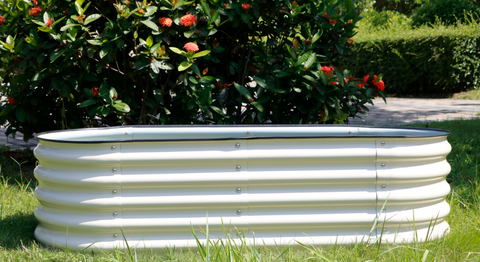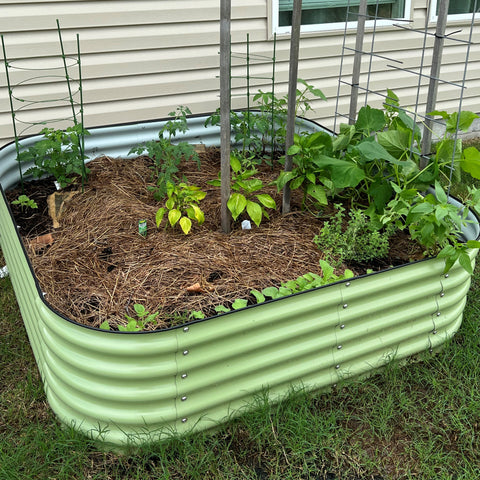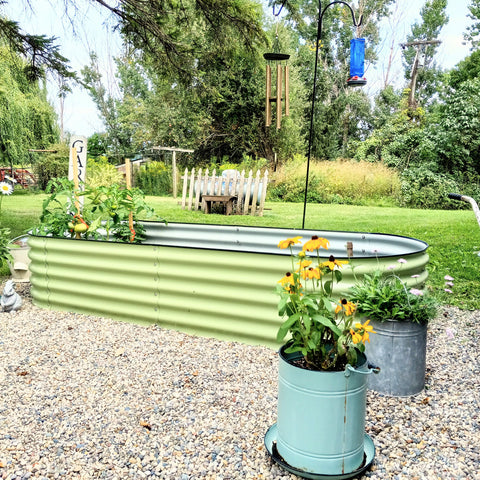Environmental Protection Tips from Olle Garden Bed For Organic Vegetable Garden
Looking for easy to use organic vegetable gardening techniques for your garden? Although gardening is an environmentally friendly hobby, you can make your gardening tasks more environmentally friendly by adopting sustainable practices. Building organic vegetable gardens is not only a good way to enjoy high-quality crops; You also provide the healthiest food for your family. This will save you hundreds of dollars in grocery shopping every year. The following content also has some reference value for raised garden beds.

Of course, maintaining organic farms requires more maintenance than ordinary vegetable fields. Since you will not use chemicals (such as pesticides and herbicides) to prevent pests or genetically modified organisms to increase production, you must work harder to keep crops healthy and disease free. Don't worry, try our favorite organic vegetable gardening techniques:
Looking for easy to use organic vegetable gardening techniques for your garden? Although gardening is an environmentally friendly hobby, you can make your gardening tasks more environmentally friendly by adopting sustainable practices. Building organic vegetable gardens is not only a good way to enjoy high-quality crops; You also provide the healthiest food for your family. This will save you hundreds of dollars in grocery shopping every year.
Of course, maintaining organic farms requires more maintenance than ordinary vegetable fields. Since you will not use chemicals (such as pesticides and herbicides) to prevent pests or genetically modified organisms to increase production, you must work harder to keep crops healthy and disease free. Don't worry, try our favorite organic vegetable gardening techniques:

Organic mulch
When building any type of organic garden, one of our favorite organic vegetable gardening techniques is to protect the soil from the elements. When exposed to bad weather, soil tends to agglomerate due to loss of moisture. Covering can prevent evaporation of soil water, and at the same time, it can protect crops from severe cold. The covering process involves adding a layer of organic material around the plant.
This method can also reduce your gardening tasks. Because mulch prevents overgrowth of weeds, you do not have to remove weeds every day. In addition, you don't need to water the plants often, because the soil can retain more water. Finally, adding a layer of mulch to your garden will help create a cleaner landscape.
Use environment-friendly pest control
No matter how you try to keep pests away from the garden, destructive small animals will enter your crops in some way. Fortunately, there are many ways to eliminate pests in the garden without using any type of chemicals. Here are some of our favorites.
But before you spray your pest control mixture around, you must first understand what types of pests are eating in your garden. In this way, you will know exactly how to control infection and avoid wasting more products. Whether pests are eating your product, please use safe and natural pest control measures, such as neem oil, eggshells, citrus oil, diatomite, salt spray, etc.
Fertilize in the right way
Do you know that it takes months or even years to build a good soil? Using natural fertilizer to improve soil is a good way to promote plant growth and obtain higher yield. Because you want to use organic fertilizer, you must use natural fertilizer, such as rotten feces from plant eating animals (chickens, rabbits, sheep, etc.), prepackaged organic fertilizer or self-made organic fertilizer. You can also check your local garden center for compost or natural fertilizer.
However, fertilization is not always needed. If you are one of the lucky few and already have fertile soil, there is no need to build good soil. If the soil becomes too fertile, plants may develop excessive soft growth, which will only attract more pests.
Start small
If you are new to gardening, or this is your first attempt at organic gardening, it is always a good idea to start small. The first time you do this, you can expect a lot of experiments and mistakes, just try to grow your crops as healthily as possible. An overly ambitious project may eventually require more commitment, and you are likely to end up quitting.
A 100 square foot garden is a good start for beginner gardeners. You can plant various crops in such a space. In order to make full use of space, you can plant crops intensively. Once you get the results you want, you can start to expand your garden.
Start with seeds or starting plants?
It is a long process to start a garden from the seed, but the effort is worth it. It will only be more satisfying to know that you have planted all the agricultural products you put on the table in an old-fashioned way! If you are purchasing seeds, please purchase certified organic seeds from reputable suppliers.
If it is almost impossible to start with seeds, you can always buy introductory plants for your garden. Similarly, buy from reputable sellers who grow plants without using pesticides or chemicals. Some nurseries offer selected certified organic plants. You can also buy starter plants at the local farmers' market.
Use companion plants
Matching with certain types of plants can prevent pests, minimize the spread of diseases, and even enhance the flavor of some vegetables! The fact is that some plant combinations work well in nature, and planting them together will immediately improve the quality of the organic garden.
For example, planting basil and tomatoes together can help fight off hornworms on tomatoes. Planting rosemary and cabbage will stop the feast moths that could damage your garden. The chives and carrots go well together. This combination can drive away aphids and improve the flavor of carrots.
Natural extension of growing season
Investing in elevated beds is one of the most effective ways to extend the growing season and maximize production throughout the season. Planting crops on elevated beds gives you complete control over soil quality. The soil in the elevated bed tends to warm up early in spring, giving your plant enough time to produce more fruit.

Most importantly, the elevated bed can reduce your gardening burden, and also make the harvest on your back easier. You can use recycled wood to make your own elevated bed, or you can buy an elevated bed from a reputable seller. Please note that the elevated beds purchased by the store are not equal, and some are chemically treated. If you are building an organic garden, you must purchase an elevated bed without any chemical treatment!
Do you find these organic vegetable gardening techniques useful? Building organic vegetable gardens is a good way to enjoy high-quality agricultural products and save more food money. Watch more organic vegetable gardening tips! Sign up for our newsletter to get the latest gardening tips and resources!